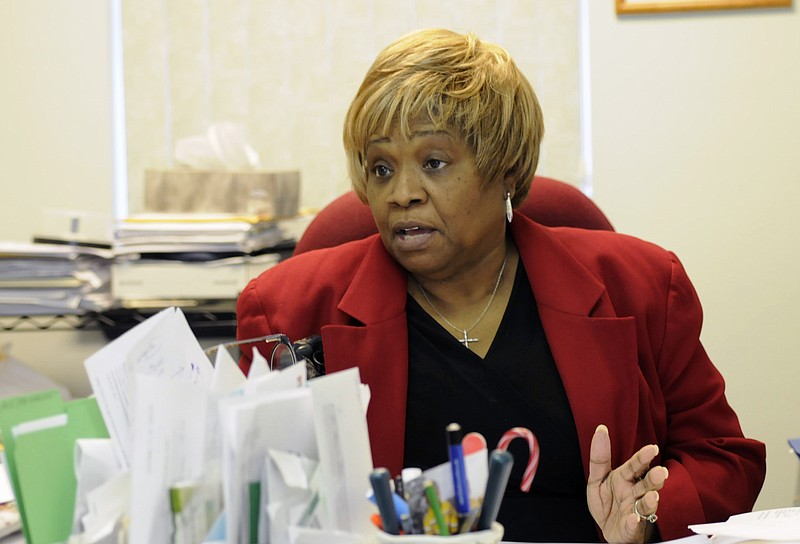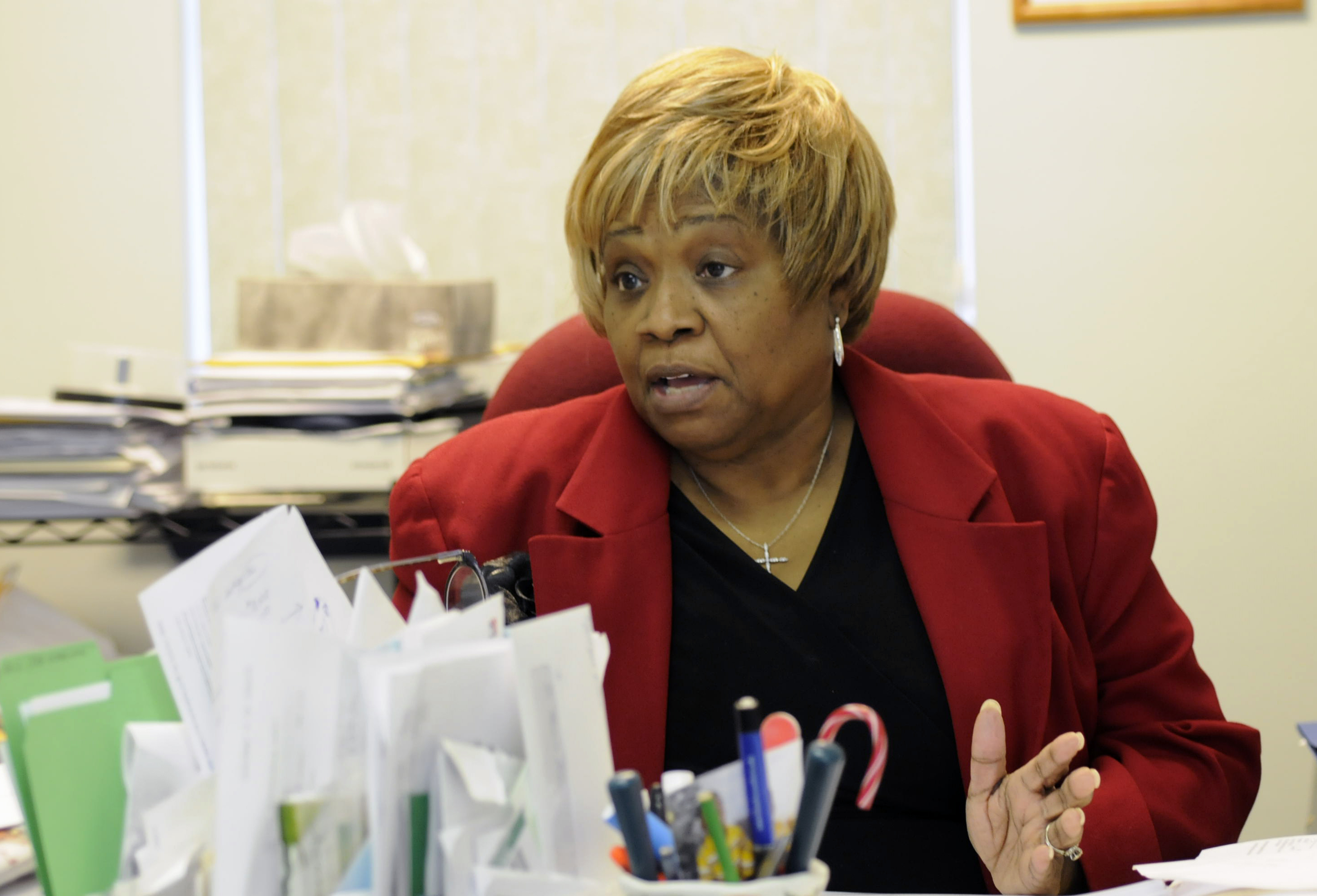WASHINGTON - The Great Recession carried special pain for black women like Jane Ladson.
She had always been the one her family members turned to when they needed help, and she didn't hesitate to give it. She helped pay for weddings and rent. She made room for her nephew when her brother died of AIDS. And even now in her 50s, she took in a baby who wasn't her own.
But help was easier to give when the economy was booming and Ladson was bringing home $4,000 a month as a mechanic at Amtrak. Even an injury on the job turned into a blessing in disguise when she collected a $700,000 settlement that allowed her to build her dream home in Clinton, Md., and help her longtime partner start her own hair salon.
Then the recession hit, and fate twisted the other way. A slip on the stairs of her home has kept her out of work since last spring. The hair salon struggled to keep customers. Ladson was forced to sell her car and fell behind on her mortgage. Foreclosure notices began replacing dinner invitations.
And yet, like so many other black women, Ladson continues to shoulder the burden of supporting her extended family of siblings, cousins, nephews and grandkids.
Across the country, black women are bearing a heavier responsibility for family and friends than their white counterparts, even as they struggle to emerge from an economic downturn that has hit them harder.
A survey by The Washington Post and the Kaiser Family Foundation reveals that black women have more trouble paying their bills or getting a loan than white women. And they are trying to regain their footing in a world where more than half feel as though they do not have the skills and education to compete for a job.
The Post-Kaiser poll of more than 800 black women is the most extensive exploration of the lives and views of African-American women in decades. In nearly 20 extended interviews with women who participated in the survey, a picture of frustration and resilience emerged.
Nearly half of the women surveyed said they help out elderly relatives, and more than a third regularly assist friends or family with child care - outpacing white women in both cases.
That means the ongoing distress felt by black women quickly can ripple through their social networks. Black women may be the pillars of their communities, but the recession has left the foundation cracked.
"To depend on anybody, as far as I'm concerned, it's just something I couldn't think of," Ladson said, tearing up. "I was sad that I couldn't help anybody, but I was even sadder I couldn't help myself."
Looking back, 57-year-old Ladson can see where things went wrong.
Her injury settlement enabled her to buy a home in the 1990s. But instead of paying off her mortgage, she participated in the boom in cheap loans in the years before the recession. In the black community in particular, fast and loose credit became widely available for purchases such as cars and homes, seemingly offering a pathway to the good life.
Besides, there were better things to do with the money, she thought at the time, such as investing in the overheated stock market and cruising to the Bahamas.
There were also her friends and family to think about. Her three-story home in the leafy subdivision of Maryland's Mount Airy Estates became not only the gathering place for holidays and get-togethers, but also a refuge. The preteen nephew she took in is grown now, but he still drops by to help her put up decorations during the holidays. A framed photo of him wearing a cap and gown at his high school graduation sits prominently in her living room.
Three years ago, Ladson learned that Pat Body, her partner of 25 years, needed a safe place for her great-granddaughter to stay. The girl was just an infant, and Ladson was nearing retirement. But how could she say no?
Now, 3-year-old Kaila Kirksey refers to Ladson as Auntie Jane, and the dream house is filled with stuffed animals and plastic teacups, the television tuned to the Disney Channel.
According to the Post-Kaiser poll, 36 percent of black women said they regularly help friends or family with child care, compared with 24 percent of white women. And 49 percent said they regularly assist elderly relatives, while 39 percent of white women did.
That dynamic persists even though the economic boom has given way to a harsher financial reality. Nearly three-quarters of black women worry about not having enough money to pay their bills, more than white men or women. Black women are more than twice as likely as white women to report problems meeting their rent or mortgage payments. Twenty-nine percent had burdensome medical bills, compared with 22 percent of white women. Nearly a quarter of black women had trouble getting a loan, while just 16 percent of white women did.
The findings dovetail with previous research by economists and sociologists that consistently show that black middle-class families tend to provide financial help to family members - especially parents and siblings - at higher rates than other racial groups do. A study last year by the Urban Institute found that African-Americans are more likely to receive familial support than whites and Hispanics, although the dollar amounts tend to be smaller.
"I think many African-Americans feel a special obligation to those family members who have not done as well," said Margaret Simms, a fellow at the Urban Institute and director of the group's Low-Income Working Families project, who led the organization's study, which did not take gender into consideration. "When you have higher incidences of unemployment and poverty in the African-American community, you find that their better-off kin will be more likely to give."
Ann Jones-Pierre of Chattanooga is not sure that black families are any different than whites, Hispanics or others. The 66-year-old Church Koinonia Federal Credit Union chief executive officer said she's certainly feeling the effects of the recession - costs are up and income is down.
But she questioned the report, saying the key to helping maintain financial stability is setting limits.
Someone who is working should make sure her family has at least six months of wages saved before making financial contributions to others, she said.
Experts who have studied these trends said that black families' generosity may come with consequences. A 2005 study by economists N.S. Chiteji and Darrick Hamilton found that black families, more than their white counterparts, struggle to build wealth because of the financial circumstances of their relatives.
"It may be that basic character traits like compassion and generosity combined with the tendency to have less fortunate relatives may actually explain the adverse outcomes experienced by some middle-class families," said Chiteji, a professor of economics at Skidmore College in Saratoga Springs, N.Y.
Several women interviewed said they put their own plans on hold so they could help others. The Post-Kaiser poll found that 60 percent of black women have loaned money to friends or family, with the rate rising to 73 percent among those who earn $65,000 or more. Margaret Wilson, 49, from Little Rock, Ark., said she used some of her retirement savings to help her sister and brother-in-law stave off foreclosure.
"She's always been my baby sister, and I feel that responsibility," she said. "It's really as simple as that."
Kathy James, 41, a married social worker from outside St. Louis, said her sister, Janice Francis, came to her for financial help after both she and her husband lost their jobs over the course of 18 months in 2008 and 2009. James said Francis, 47, and her husband saw their $125,000 annual household income slashed by 75 percent and were close to losing their home.
James offered to loan them six months of mortgage payments and other living costs while the couple got back on their feet - even though she had been saving the money to return to school for her master's degree. The couple hasn't been able to start repaying her yet, but James said she won't charge her sister interest.
"It's what you do as family, really, so I didn't really think too much of it," James said in an interview.
Chattanooga Times Free Press staff writer Yolanda Putman contributed to this report.

